

Idées. Ideas What ideas are known to be most critical to shaping student learning and academic success?
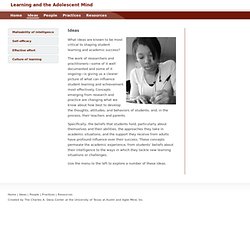
The work of researchers and practitioners—some of it well documented and some of it ongoing—is giving us a clearer picture of what can influence student learning and achievement most effectively. Concepts emerging from research and practice are changing what we know about how best to develop the thoughts, attitudes, and behaviors of students, and, in the process, their teachers and parents. Specifically, the beliefs that students hold, particularly about themselves and their abilities, the approaches they take in academic situations, and the support they receive from adults have profound influence over their success. These concepts permeate the academic experience, from students’ beliefs about their intelligence to the ways in which they tackle new learning situations or challenges.
Use the menu to the left to explore a number of these ideas. Introduction : sentiments d’efficacité personnelle et orientation scolaire et professionnelle. 1Ce numéro spécial poursuit quatre objectifs : 2 Je remercie Philippe Carré qui a organisé à Toulouse, en mai 2006, à la suite du 7e colloque europ (...)
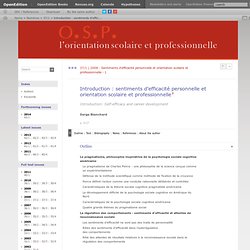
Présenter la théorie des sentiments d’efficacité personnelle (SEP) – qui s’insère dans le cadre plus général de la théorie sociale cognitive (TSC) d’Albert Bandura – et les principaux résultats des recherches qu’elle a suscitées depuis vingt-cinq ans aux États-Unis dans le domaine de l’orientation scolaire et professionnelle.L’article de Stephen Brewer présente d’abord une biographie d’Albert Bandura puis une brève introduction à ses travaux. 2Dans cette introduction, nous présenterons quelques thèmes du pragmatisme qui ont inspiré le développement de la psychologie sociale cognitive américaine dont nous décrirons les principales caractéristiques. 3 Laugier (2007), voit en Ralph Emerson (1803-1882) et Henri Thoreau (1817-1862) des inspirateurs du (...) 4 Ce jugement est évidemment relatif.
. « 1. Quatre grands thèmes du pragmatisme social. Lara.inist.fr/bitstream/handle/2332/1323/INSERM_psycho_part3.pdf?sequence=4. Motivation et reussite des apprentissages scolaires - Jean Baptiste NDAGIJIMANA. Les théories interactionnistes accordent la prédominance à l'interaction entre facteurs internes et externes.
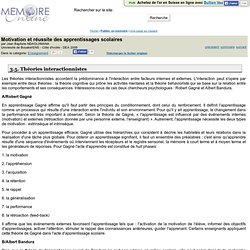
Apprentissage auto-régulé. Communauté d'apprenants. Culture of learning The culture of learning has a profound impact on students’ academic behaviors.
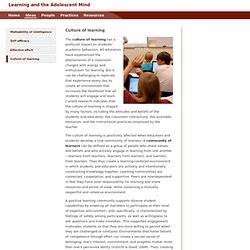
All educators have experienced the phenomenon of a classroom charged with energy and enthusiasm for learning. But it can be challenging to replicate that experience every day to create an environment that increases the likelihood that all students will engage and learn. Current research indicates that the culture of learning is shaped by many factors, including the attitudes and beliefs of the students and educators, the classroom interactions, the available resources, and the instructional practices employed by the teacher. Persistance. Effective effort Persistence is continuation of effort and striving in the face of difficulty, opposition, or failure: it is a key characteristic of successful people across professional and academic disciplines.
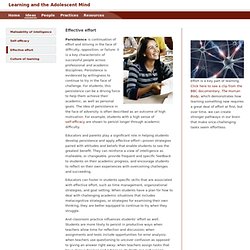
Persistence is evidenced by willingness to continue to try in the face of challenge. For students, this persistence can be a driving force to help them achieve their academic, as well as personal goals. L'auto-efficacité. Self-efficacy Self-efficacy is the belief in one’s capabilities, or the degree of confidence that people have in their ability to succeed at a task that matters to them.
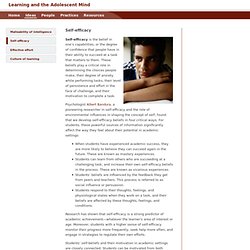
These beliefs play a critical role in determining the choices people make, their degree of anxiety while performing tasks, their level of persistence and effort in the face of challenge, and their motivation to complete a task. Jacquelynne Eccles. Jacquelynne Eccles Jacquelynne Eccles is a professor of psychology and a research scientist at the University of Michigan.
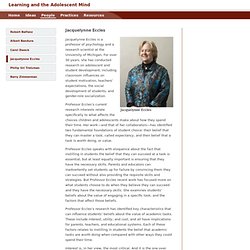
For over 30 years, she has conducted research on adolescent and student development, including classroom influences on student motivation, teachers’ expectations, the social development of students, and gender-role socialization. Carol Dweck. Carol Dweck Carol S.
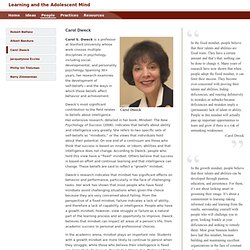
Dweck is a professor at Stanford University whose work crosses multiple disciplines in psychology, including social, developmental, and personality psychology. Spanning 30+ years, her research examines the development of self-beliefs—and the ways in which those beliefs affect behavior and achievement. Dweck’s most significant contribution to the field relates to beliefs about intelligence. Her extensive research, detailed in her book, Mindset: The New Psychology of Success (2006), indicates that beliefs about ability and intelligence vary greatly. Robert Balfanz. Robert Balfanz Robert Balfanz is a principal research scientist at the Center for Social Organization of Schools at Johns Hopkins University and a co-director of the Everyone Graduates Center.
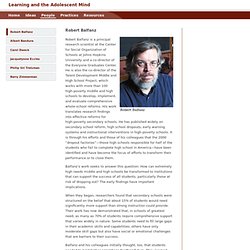
He is also the co-director of the Talent Development Middle and High School Project, which works with more than 100 high-poverty middle and high schools to develop, implement, and evaluate comprehensive whole-school reforms. His work translates research findings into effective reforms for high-poverty secondary schools. He has published widely on secondary school reform, high school dropouts, early warning systems and instructional interventions in high-poverty schools.
Philip Uri Treisman. Philip Uri Treisman Philip Uri Treisman Philip Uri Treisman is a professor of mathematics and public affairs at the University of Texas at Austin and also the founder and executive director of the Charles A.
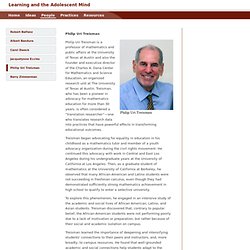
Dana Center for Mathematics and Science Education, an organized research unit at The University of Texas at Austin. Treisman, who has been a pioneer in advocacy for mathematics education for more than 30 years, is often considered a “translation researcher”—one who translates research data into practices that have powerful effects in transforming educational outcomes. Johns Hopkins chercheur en éducation Balfanz reçoit Blanc honneur House. Robert Balfanz Related Articles Chronically absent students can slow pace of learning for an entire class, particularly in middle school, School of Education researcher says Robert Balfanz, a senior research scientist at Johns Hopkins, is among 10 education leaders named White House "Champions of Change" for their commitment to furthering education among African-Americans.
He was honored in ceremonies Tuesday afternoon at The White House. Balfanz is a national expert who focuses on America's dropout crisis, chronic absenteeism, and the warning signs that show as early as sixth grade which students are likely to drop out of high school. James Heckman. James Joseph Heckman (born 19 April 1944) is an American economist and Nobel laureate. He is the Henry Schultz Distinguished Service Professor of Economics at the University of Chicago, Professor of Science and Society at University College Dublin and a Senior Research Fellow at the American Bar Foundation. Heckman shared the Nobel Memorial Prize in Economics in 2000 with Daniel McFadden for his pioneering work in econometrics and microeconomics. He is considered to be among the ten most influential economists in the world.[1] Biography[edit] Early years[edit] Heckman was born to John Jacob Heckman and Bernice Irene Medley in Chicago, Illinois.[2] Heckman received his B.A. in mathematics from Colorado College, and received his Ph.D. from Princeton University in economics in 1971.
Claude Steele - Wikipédia, l'encyclopédie libre. Www.svt.edunet.tn/nabeul/svtna05/telechargement/theories_apprentissage.pdf. Barry Zimmerman. Barry J. Zimmerman is an educational researcher at the City University of New York, where he holds the title Distinguished Professor of Educational Psychology. He has written over 100 scholarly publications on learning and motivation, many describing his research and theories on self-regulated learning. In 2011, Zimmerman was awarded the E.L. Thorndike Career Achievement award by the American Psychological Association's Division of Educational Psychology.[1] See also[edit] Albert Bandura External links[edit] Zimmerman Receives 1999 Scribner Award References[edit]
D_Schunk_Influencing_2007. Théories de l'apprentissage - Idées ASH. Apprendre, c'est comprendre. C'est construire un savoir que l'on va pouvoir réinvestir. Pour que l'élève apprenne, il est essentiel: Qu'il soit conscient de ce que l'on essaie de lui faire comprendre et pourquoi.Qu'il soit conscient de " comment " il apprend.Qu'il ait envie d'apprendre. Enseigner, c'est aider l'enfant à apprendre, à construire un savoir. Une conception sociale cognitive de l’orientation scolaire et professionnelle : considérations théoriques et pratiques. 1La théorie sociale cognitive de l’orientation scolaire et professionnelle (TSCOSP) a été conçue en vue de développer un système explicatif bien intégré de l’orientation scolaire et professionnelle (Lent, Brown & Hackett, 1994, 2000).
Formations ouvertes: Libertés de choix et autodirection de l'apprenant - Annie Jezegou. Microsoft PowerPoint - V3-Diaporama_Université_rentrée_CFPB_2008.ppt - 16h00-carre.pdf.